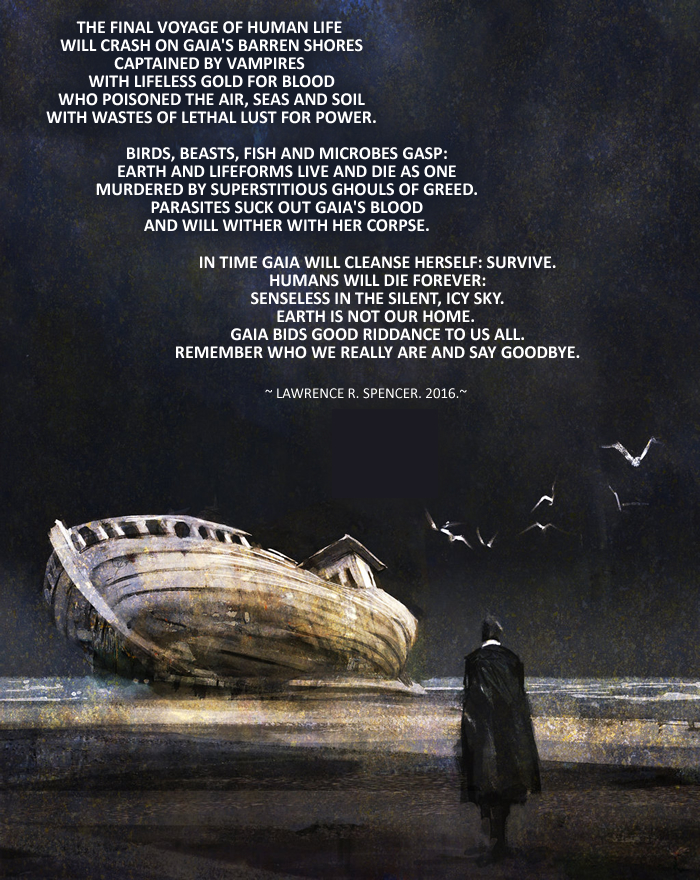Republished by Blog Post Promoter
TRANSCENDENCE:
a Solitary Climb
from Decadence
toward The Sublime.
Religions all say
Their Path is well Known.
But how do they know The Way?
At Death, You must Ascend Alone.
_______________
Lawrence R. Spencer. 2013
Republished by Blog Post Promoter
TRANSCENDENCE:
a Solitary Climb
from Decadence
toward The Sublime.
Religions all say
Their Path is well Known.
But how do they know The Way?
At Death, You must Ascend Alone.
_______________
Lawrence R. Spencer. 2013
Republished by Blog Post Promoter
Republished by Blog Post Promoter
 THE FINAL VOYAGE OF HUMAN LIFE
THE FINAL VOYAGE OF HUMAN LIFE
WILL CRASH ON GAIA’S BARREN SHORES
CAPTAINED BY VAMPIRES
WITH LIFELESS GOLD FOR BLOOD
WHO POISONED THE AIR, SEAS AND SOIL
WITH WASTES OF LETHAL LUST FOR POWER.
BIRDS, BEASTS, FISH AND MICROBES GASP:
EARTH AND LIFEFORMS LIVE AND DIE AS ONE
MURDERED BY SUPERSTITIOUS GHOULS OF GREED.
PARASITES SUCK OUT GAIA’S BLOOD
AND WILL WITHER WITH HER CORPSE.
IN TIME GAIA WILL CLEANSE HERSELF: SURVIVE.
HUMANS WILL DIE FOREVER:
SENSELESS IN THE SILENT, ICY SKY.
EARTH IS NOT OUR HOME.
GAIA BIDS GOOD RIDDANCE TO US ALL.
REMEMBER WHO WE REALLY ARE AND SAY GOODBYE.
~ Lawrence R. Spencer. 2016.
_________________________
In Greek mythology, Gaia is the personification of the Earth and one of the Greek primordial deities. Gaia was the great mother of all: the primal Greek Mother Goddess; creator and giver of birth to the Earth and all the Universe; the heavenly gods, the Titans, and the Giants were born to her. The gods reigning over their classical pantheon were born from her union with Uranus (the sky), while the sea-gods were born from her union with Pontus (the sea). Her equivalent in the Roman pantheon was Terra.
Republished by Blog Post Promoter
“I have been feeding pigeons, thousands of them, for years; thousands of them, for who can tell —
“But there was one pigeon, a beautiful bird, pure white with light gray tips on its wings; that one was different. It was a female. I would know that pigeon anywhere.”
“No matter where I was that pigeon would find me; when I wanted her I had only to wish and call her and she would come flying to me. She understood me and I understood her.
“Yes,” he replied to an unasked question. “Yes, I loved that pigeon, I loved her as a man loves a woman, and she loved me. When she was ill I knew, and understood; she came to my room and I stayed beside her for days. I nursed her back to health. That pigeon was the joy of my life. If she needed me, nothing else mattered. As long as I had her, there was a purpose in my life.”
“Then one night as I was lying in my bed in the dark, solving problems, as usual, she flew in through the open window and stood on my desk. I knew she wanted me; she wanted to tell me something important so I got up and went to her.
“As I looked at her I knew she wanted to tell me — she was dying. And then, as I got her message, there came a light from her eyes — powerful beams of light.
“Yes,” he continued, again answering an unasked question, “it was a real light, a powerful, dazzling, blinding light, a light more intense than I had ever produced by the most powerful lamps in my laboratory.
“When that pigeon died, something went out of my life. Up to that time I knew with a certainty that I would complete my work, no matter how ambitious my program, but when that something went out of my life I knew my life’s work was finished.”
___________________________
— From PRODIGAL GENIUS: The Life of Nikola Tesla by John J. O’Neill:
 “The soul, being eternal, after death is like a caged bird that has been released. If it has been a long time in the body, and has become tame by many affairs and long habit, the soul will immediately take another body and once again become involved in the troubles of the world. The worst thing about old age is that the soul’s memory of the other world grows dim, while at the same time its attachment to things of this world becomes so strong that the soul tends to retain the form that it had in the body. But that soul which remains only a short time within a body, until liberated by the higher powers, quickly recovers its fire and goes on to higher things.”
“The soul, being eternal, after death is like a caged bird that has been released. If it has been a long time in the body, and has become tame by many affairs and long habit, the soul will immediately take another body and once again become involved in the troubles of the world. The worst thing about old age is that the soul’s memory of the other world grows dim, while at the same time its attachment to things of this world becomes so strong that the soul tends to retain the form that it had in the body. But that soul which remains only a short time within a body, until liberated by the higher powers, quickly recovers its fire and goes on to higher things.” PLUTARCH (c. AD 46 – AD 120) was a Greek historian, biographer and essayist, known primarily for his Parallel Lives and Moralia.
Plutarch was born to a prominent family in the small town which lies approximately eighty kilometres east of Delphi, in the Greek region known as Boeotia. He lived most of his life at Chaeronea, and was initiated into the mysteries of the Greek god Apollo. However, his duties as the senior of the two priests of Apollo at the Oracle of Delphi (where he was responsible for interpreting the auguries of the Pythia) apparently occupied little of his time. He led an active social and civic life while producing an extensive body of writing, much of which is still extant.
Plutarch spent the last thirty years of his life serving as priest in Delphi. He thus connected part of his work with the sanctuary of Apollo, the processes of oracle giving and the personalities which lived or traveled there. One of his most important works is the “Why Pythia does not give oracles in verse”